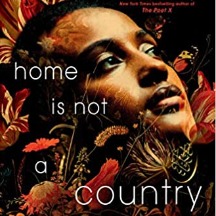Home is Not a Country is a novel in free verse and written for young adult readers. The story delights in countless ways. Written by the young Sudanese American writer and poet Safia Elhillo, the book tells the story of a teenaged Muslim, first-generation immigrant girl called Nima - - in Arabic her name is written and pronounced Niʿma, with the guttural consonant ʿayn in the middle.
Nima’s parents’ country of birth is not mentioned by name, but the cultural references - - dances (such as the raqaba), songs (from Sudan and Egypt), and dress (women’s colorful chiffon tobes) all point to Sudan.
Nima feels inadequate, awkward, and unloved in her U.S. environment and imagines a spirit double, called Yasmeen, the name her absent father had chosen for her before she was born. Nima imagines Yasmeen as the girl still living in their homeland, whose Arabic is perfect, is prettier, and more graceful - - in short, a better and more lovable version of Nima herself.
Home, Does Not Have to Be the Country Your Parents Left Behind

Nima’s only friend is her classmate and neighbor Haitham, the son of another woman, who had emigrated to the U.S. with her own mother. Nima’s thoughts and feelings, her close friendship with Haitham, and her experiences at school, where she is othered, harassed, and even assaulted, are the subject of the first part of the book.
The story becomes even more captivating when it adds a dimension of magical realism and takes an unexpected turn. In the company of spirit double Yasmeen, Nima finds herself time-traveling to her homeland and the past, where hidden, unpleasant truths about her own, as well as Haitham’s father become clear.
On her return, Nima looks at herself and her life in the U.S. with different eyes. Having crossed and re-crossed the thin line between the human and spirit worlds, she stops chasing the ghosts of her past and becomes more grounded in her own body and person, in the love of the friends and family, and in her new environment. Home, she finds, does not have to be the country your parents left behind.
The story becomes even more captivating when it adds a dimension of magical realism and takes an unexpected turn. In the company of spirit double Yasmeen, Nima finds herself time-traveling to her homeland and the past, where hidden, unpleasant truths about her own, as well as Haitham’s father become clear.
On her return, Nima looks at herself and her life in the U.S. with different eyes. Having crossed and re-crossed the thin line between the human and spirit worlds, she stops chasing the ghosts of her past and becomes more grounded in her own body and person, in the love of the friends and family, and in her new environment. Home, she finds, does not have to be the country your parents left behind.
Advertisers | Contact Us | Events | Links | Media Kit | Our Company | Payments Pier
Press Room | Print Cover Stories Archives | Electronic Issues and Talk Radio Archives | Writer's Guidelines

 ">
">



